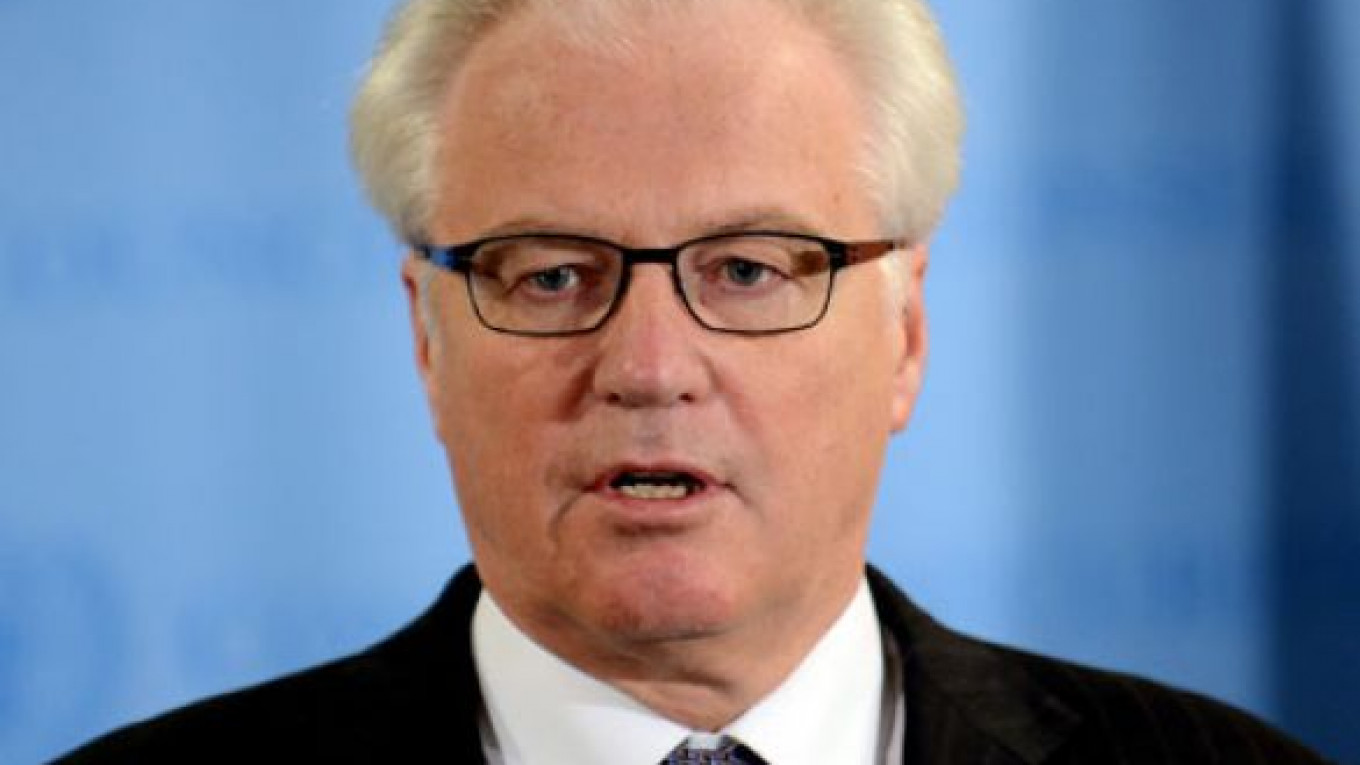The Russian UN ambassador slammed leaks to the media from a closed-door Security Council briefing on Syria, saying diplomats and journalists involved should be stripped of UN accreditation for the release of confidential information.
Vitaly Churkin was angry that some diplomats conveyed to Reuters that the UN-Arab League mediator for the Syrian conflict, Lakhdar Brahimi, told the 15-member council that Syrian President Bashar Assad had accepted Brahimi's plan for an Eid holiday ceasefire.
"It's a shame that somebody's feeding information, or disinformation, to Reuters from the consultation room of the Security Council. This is a scandalous thing, [and] we have seen this before. I hope they are paid well," Churkin told reporters.
Reuters adhered to the highest standards in reporting this story, a company spokesperson said. "It is fair and accurate and we stand by it," the spokesperson said.
Despite his frustration at the leak, Churkin confirmed the Reuters article in comments to reporters at the Security Council media stakeout after the briefing on the 19-month Syrian conflict had finished.
Churkin, a former Soviet government spokesman, also said Russia had raised the issue during the meeting and asked the UN secretariat to investigate.
"We believe that this is a gross violation of professional ethics so we'll be fighting that, if need be by stripping those who are resorting to this of UN accreditation," Churkin said.
"We don't want to have another Murdoch soap opera in the United Nations," he said, apparently referring to the phone-hacking scandal that engulfed News Corp Chairman and CEO Rupert Murdoch's British media empire.
Other Security Council delegations, including the United States, have complained in the past about leaks from closed meetings to the media, though none has called for reporters or diplomats to lose their accreditations over it.
The UN secretariat had no immediate reaction.
Around 30,000 people have been killed in Syria since a government crackdown on peaceful pro-democracy protests in March 2011 spiraled into civil war.
The United States and European council members blame Russia, a staunch ally and key arms supplier for Assad's government, and China for the council's deadlock on the conflict. Moscow and Beijing have vetoed three resolutions condemning Assad and reject the idea of sanctioning his government.
A diplomat present at the Syria briefing, who was speaking on condition of anonymity, said Churkin had told the council that it was illegal to report on confidential consultations.
"He completely lost it," the diplomat told Reuters. Other envoys confirmed his remarks.
Robert Mahoney, deputy director of the Committee to Protect Journalists, said confidential sources were the key to reporters covering various beats, including international diplomacy.
"Journalists and news organizations should not be intimidated for doing their job, especially when covering organizations whose mandate is to defend freedom of expression," Mahoney said in a statement.
Churkin suggested that press freedom should not be unlimited.
"I respect freedom of the media, and I think we need to be open, but the payoff for that is inevitably that the media needs to respect the confidentiality of the work of the Security Council," Churkin said.
Media watchdogs have raised concerns about media freedom in post-Soviet Russia. At least 32 journalists have been murdered in Russia since 1992, including Kremlin critic Anna Politkovskaya in 2006, and most have gone unsolved, the Committee to Protect Journalists says.
It lists Russia as the ninth-worst country in the world for the treatment of journalists.
Related articles:
A Message from The Moscow Times:
Dear readers,
We are facing unprecedented challenges. Russia's Prosecutor General's Office has designated The Moscow Times as an "undesirable" organization, criminalizing our work and putting our staff at risk of prosecution. This follows our earlier unjust labeling as a "foreign agent."
These actions are direct attempts to silence independent journalism in Russia. The authorities claim our work "discredits the decisions of the Russian leadership." We see things differently: we strive to provide accurate, unbiased reporting on Russia.
We, the journalists of The Moscow Times, refuse to be silenced. But to continue our work, we need your help.
Your support, no matter how small, makes a world of difference. If you can, please support us monthly starting from just $2. It's quick to set up, and every contribution makes a significant impact.
By supporting The Moscow Times, you're defending open, independent journalism in the face of repression. Thank you for standing with us.
Remind me later.






